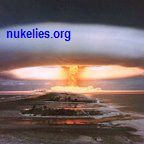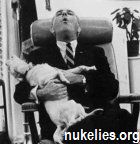
by mooninquirer » 30 Mar 2011 23:59
I accept that nuclear power plants are a reality, and that this helps us understand that nuke bombs are a hoax. Some people say, " if nuclear power plants exist, then nuclear bombs must exist." But I don't accept this, and we can easily turn it around. I say, " since there is no way that nuclear power plants could ever explode, then there is no way that nuclear bombs would explode.
I believe the situation in Japan is very grave, but it is not as bad as Chernobyl, and this is admitted in the media. All that is going to happen is that radioactive matter is going to be released into the atmosphere, and it would be a much lesser amount than the nuke blasts supposedly in the open air.
Somehow, in the late 40s and early 50s, it was acceptable to explode nuke bombs in the open air, near Las Vegas. So, why hasn't THAT been described as a "very grave situation" with respect to radiation ?
In that era, people just did not have a conception of what radiation was, and the only way to convince people of the ( supposed ) destructive power of a nuke bomb was to talk about the blast effects. But NOW, it seems the opposite is true ---- to get people worried about nuke bombs, there is a great discussion of the harmful effects of radiation. All of this talk about radiation over the years from grade school science classes to being repeated in the news has sunk in, but I think they have exaggerated its harmful effects on the body.
And as for the radiation escaping from the nuclear reactor, this is only radioactive matter, and not a large source of radiation being spewed out like the nuclear fission itself, without the shielding. The radioactive isotopes of hydrogen and oxygen in the water being released decay over time. It is not like an immense shower of gamma, beta, and neutron radiation that would be coming from a nuclear reaction itself, like from the Sun ( for someone in outer space without the shielding protection of the Earth's magnetosphere, and atmosphere ), or from a lot of atoms fissioning, like what occurs inside a nuclear reactor, while the reaction is taking place.
A good physics lecture on the physics behind nuclear fission, nuclear reactors, and an ATTEMPT to explain why nuclear bombs explode, can be seen by typing into the youtube space : UC BERKELEY PHYSICS NUKES
Note the professor's absolute assurance that a nuclear power plant is NOT going to explode. The worst case scenario is a meltdown, which is a self correcting mechanism, because the fissile material is no longer going to be a critical mass.
Note that the professor cannot explain why a nuclear reactor is different from a nuclear bomb. And at the end, when he describes a nuclear bomb exploding, he admits that initially it is no greater than a conventional explosive bomb, but the greater blast of a nuclear bomb is contingent upon a secondary fissioning of the fissile material in mid air after it has exploded. But this is impossible, because it was necessary to bring subcritical pieces together in the first place, in order to have a chain reaction ! And since nuclear fissioning is contingent upon neutrons hitting nuclei, and the nuclei are already spaced very far apart even in compact fissile matter, it is going to be even harder for the neutrons to hit the nuclei when the matter is exploded apart. If it is hard to shoot ducks while they are assembled on a pond, it is going to be even HARDER to shoot and hit ducks after they fly away in all directions.



